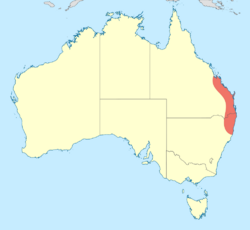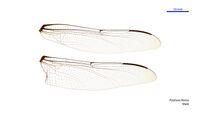Biology:Petalura litorea
| Coastal petaltail | |
|---|---|
| Scientific classification Error creating thumbnail: Unable to save thumbnail to destination
| |
| Domain: | Eukaryota |
| Kingdom: | Animalia |
| Phylum: | Arthropoda |
| Class: | Insecta |
| Order: | Odonata |
| Infraorder: | Anisoptera |
| Family: | Petaluridae |
| Genus: | Petalura |
| Species: | P. litorea
|
| Binomial name | |
| Petalura litorea Theischinger, 1999[2]
| |

| |
Petalura litorea, commonly known as the coastal petaltail,[3] is an endangered Australia n species of dragonfly from the family Petaluridae.[4]
This species originates from south-eastern Queensland and prefers swamp land with thick vegetation, often residing on sword grass. The endangered species description is currently recorded in the New South Wales government Endangered Species listing.[5]
Body
Coastal petaltails have distinctive bodies that are unique to their species. The average petaltail has a body around 10 cm (4 in) in length, with wide-set eyes and a black thorax covered in yellow spots; the abdomen follows a similar pattern consisting of black and yellow stripes. Petaltails' pterostigmata are long and thin, running to and from either side of their wings. Female petaltails have rounded wings, while male petaltails have angular wings.[6]
Mating
Male coastal petaltails have unique, bright orange anal appendages called 'petaltails' that are believed to be used to attract a mate.[6] Once a mate has been attracted, the male and female begin mating, the female positioned upwards towards the sky, and the male in an upside down fashion, lasting for an average of thirty minutes. Once the male and female are finished, the female goes off to lay her eggs in a burrow, often near a body of water. Larvae that nest in these caves often are subject to attack from underwater predators that can easily access the burrow from a nearby body of water. If the larvae survive the incubation process the average coastal petaltail's lifespan is approximately 6 years.[6]
Gallery
See also
- List of Odonata species of Australia
References
| Wikimedia Commons has media related to Petalura litorea. |
- ↑ Dow, R.A. (2017). "Petalura litorea". IUCN Red List of Threatened Species 2017: e.T163555A87528568. doi:10.2305/IUCN.UK.2017-1.RLTS.T163555A87528568.en. https://www.iucnredlist.org/species/163555/87528568.
- ↑ Theischinger, G. (1999). "A new species of Petalura Leach from south-eastern Queensland (Odonata: Petaluridae)". Linzer Biologische Beiträge 31 (1): 159–166 [160]. http://www.zobodat.at/pdf/LBB_0031_1_0159-0166.pdf.
- ↑ Theischinger, Günther; Hawking, John (2006). The Complete Field Guide to Dragonflies of Australia. Collingwood, Victoria, Australia: CSIRO Publishing. pp. 108. ISBN 978-0-64309-073-6.
- ↑ "Petalura litorea Theischinger, 1999". Australian Faunal Directory. Department of the Environment, Water, Heritage and the Arts. 9 October 2008. http://www.environment.gov.au/biodiversity/abrs/online-resources/fauna/afd/taxa/Petalura_litorea.
- ↑ "New South Wales Government- Endangered species listing and description". South Wales: New South Wales Government. http://www.environment.nsw.gov.au/listings/PetaluraGiganteaAmendment.htm.
- ↑ 6.0 6.1 6.2 "Coastal Petaltail Dragonflies". Australia: Brisbane Insects. http://www.brisbaneinsects.com/brisbane_dragons/CoastalPetaltail.htm.
Wikidata ☰ Q5229434 entry
 |




